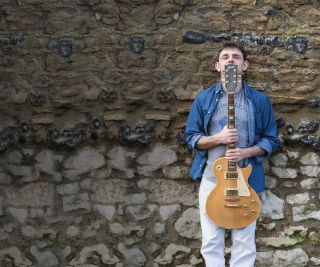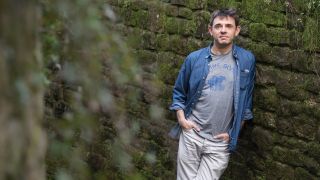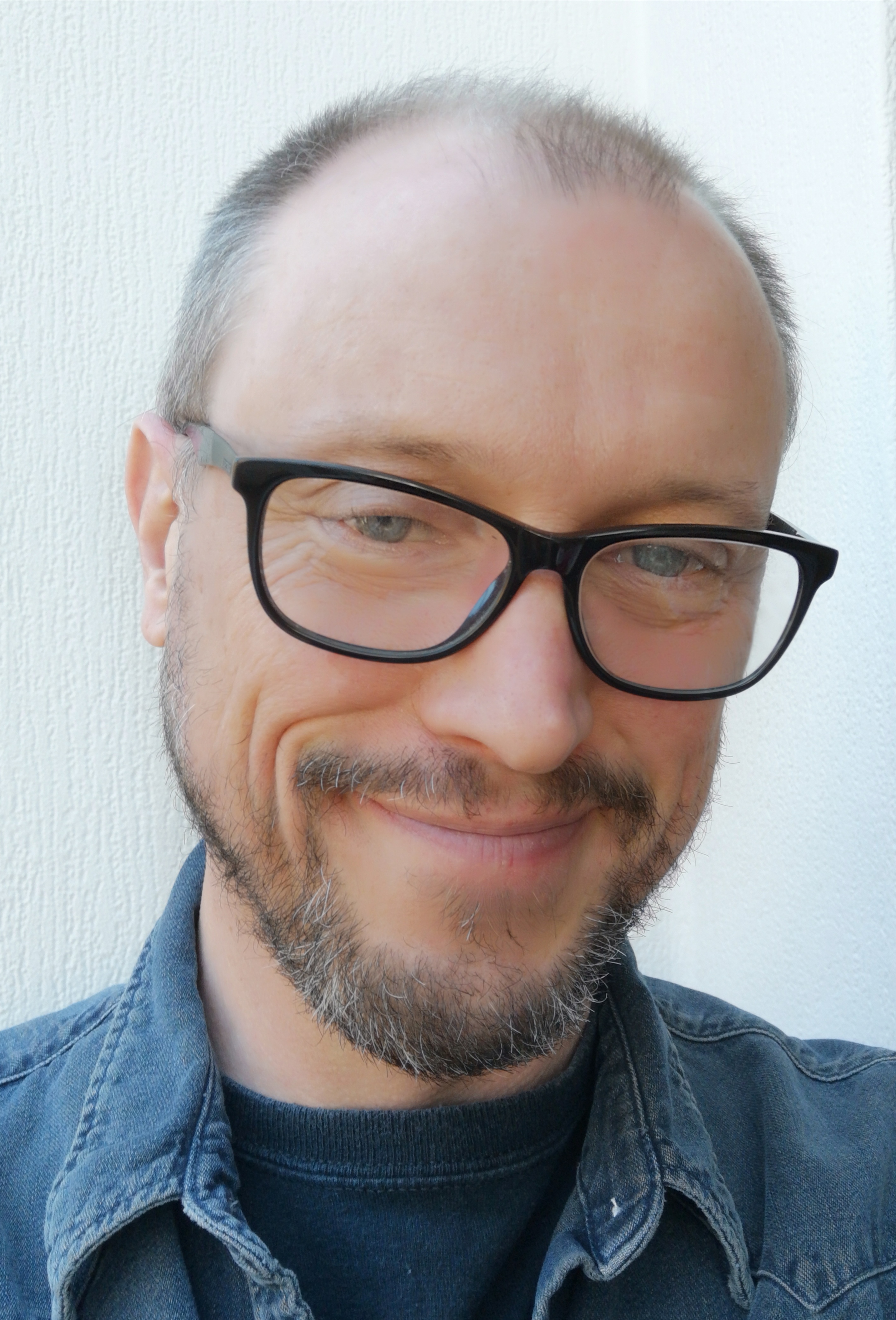Last night, there was a rally outside Downing Street, with thousands converging on Whitehall to protest against President Trump and his travel ban. Alan Reed was there in his professional capacity. In his extra-musical life he’s a Senior Home Affairs Producer for the BBC, running a specialist unit of correspondents covering policing, prisons, terrorism and paedophile cases. “All the happy stuff,” he deadpans as we meet the day after. “As we say in our unit, we don’t do ‘And finally…’ It’s hard work, there’s lots of stuff in your head at all times, but it’s very rewarding. I compartmentalise everything, the work and music are separate things.”
These two strands of Reed’s life do collide, though. Once, he was in the BBC newsroom and looked over to see the editor of The 10 O’Clock News showing presenter Huw Edwards one of his music videos online. He gets teased at Home Office parties by their Head Of Press, an old journalist friend who enjoys introducing him as ‘former rock star Alan Reed’. A few times his musical credentials have come in handy, too. Years ago he was trying to get his team into the Nowa Huta Steelworks in Krakow, Poland to cover a story, and was struggling to find an English-speaking contact there. “I called a Polish DJ I knew,” he says, “and incredibly it turned out his day job was at the steelworks! He said, ‘Is that Alan Reed from Pallas?’ And the doors opened, he knew everyone. Later he took me and the team for dinner and at the end he took a bag out with everything I’d ever done, to sign.”
And yet we all compartmentalise the various parts of our lives, we present different faces, and one song on his striking new album, Honey On The Razor’s Edge, deals with just that. Leaving rests on a beautifully enigmatic acoustic guitar melody and features gorgeous harmonies from one of the album’s many contributors, Monique Van Der Kolk. The lyrics deal with what Reed calls, “The tension between your professional persona and the ‘real you’, in your homelife. People think they know you, but there are many versions of you.”
There aren’t enough versions of Alan Reed at the moment, what with that onerous day job, and the recording, release of and organisation for the new album, and upcoming live dates. From its fascinating title to its Celtic-inspired coda Northern Light, Honey On The Razor’s Edge sounds and feels like Reed really stretching his legs, finally coming out of the shadows of his long history with Pallas, the band from which he was unceremoniously fired in 2010 after over two decades. That ignominious end clearly still rankles. Asked how things are between them now, his reply is uncharacteristically terse: “Well, they know where I am if they want to apologise.”
His first solo record proper, First In A Field Of One, came three years after that event. In hindsight, it’s a solid work, if a slightly understated, almost tentative one. “After Pallas I thought, ‘What the hell do I do now?’ Whatever it was, it shouldn’t sound like them, it had to be different. I’d been writing and gigging with acoustic guitar, and what more natural way to get away from the Sturm und Drang of Pallas than to strip it down to the basics? This time I thought, ‘Bugger it – Pallas aren’t that active anymore so I can reclaim some of that territory from them.’ So if I wanted electric guitars I’d have them. If I wanted Mellotron or Taurus pedals, then yes.”
Fellow ex-Pallas member, keyboardist Mike Stobbie, features prominently on the follow-up, which launches with the bright, pop prog calling card, My Sunlit Room. Stobbie’s MiniMoog sets the tone to a song whose title was inspired by one Sid Smith, of this very parish. “Sid’s blog is called Postcards From The Yellow Room,” says Reed, “and that’s where I got the idea, as I get the sun in my room in the morning too. The song’s about the process of making the album. You have to shut yourself off from the world – to a constant litany of complaint from the family – and you emerge hours later. It’s a bit of a ‘fuck the rest of the world’. I’m in my space, doing my thing and getting something out of it. I make no apology for it.”
That’s also the sentiment behind the album title, an ambiguous phrase he heard on a radio show about mental health. “I loved the image. For me it’s about having a safe, sweet spot, even when things are bad, when life’s falling apart or you’re not certain where you are. You’ve got this one little thing that’s yours, that’s golden and light when everything else is cold, dark and blue.”
The Other Side Of The Morning develops from chiming 12-string acoustic arpeggios into an ambitious, trad prog epic complete with Mellotron choir. Reed’s vocals – harmony-rich, high and freighted with feeling – have rarely sounded this assured and purposeful, and those 12-strings have a definite ring of Steve Hackett-era Genesis about them.

Reed met Hackett a few years ago at a Classic Rock Society event, and their friendship culminated in Reed opening dates for him on the 2013 Genesis Revisited tour. Hackett returns the favour here, adding, not guitar, but a rootsy/exotic harmonica solo on the brooding, Eastern-flavoured Razor. “Steve loves that bluesy cross-harp stuff,” says Reed. “Originally I had a silly, noisy, David Rhodes-type solo on it – I was going for a Peter Gabriel/Led Zeppelin vibe – but I suddenly thought it needed a blues harp. I emailed Steve, he said he’d love to do it, I sent him the track, and he banged this great solo out at his studio and sent it back.”
French prog band Lazuli opened for Pallas years ago (Reed reciprocated, supporting them solo in 2015), and Razor also features Claude Léonetti, who adds texture with his own utterly unique instrument, his Léode. “What Claude can do with it is amazing,” says Reed. “It’s part electric guitar, part saz, part electric violin. God knows how I’m going to do that live!”
The song also has its own video, directed by Magenta’s Rob Reed (no relation). In it, Alan argues with his alter ego in a mirror while shaving, and the inner conflict ends in pretty gruesome style, hence the video’s Parental Advisory warning. “It is quite striking,” says Reed. “It should get a response, but if it gives people a bit of a jolt it might be helpful, might make them think again about what I do.”
What he does outside of music has inevitably informed his art. One of the cases his team has reported on is Operation Yewtree, and there’s an insidious darkness to Cross My Palm, his comment on the sordid underbelly of the media. “One of the first trials was Max Clifford. He reminded me of those powerful figures I met back in the early days from these record labels – they’d put an arm around you, tell you they were going to make you a star. After he went on trial a lot of stuff came out about him. That song’s about PR guys, deals with tabloid newspapers: ‘Yeah, I’ll forget about your dalliance with a young girl as long as you do us an exclusive.’
“Doing what I do, you’re paid to leave your opinions at the door, but you have feelings as a human being, and writing the songs helps release them.”
- Alan Reed To Release New Album Honey On The Razor's Edge
- Alan Reed Studio Report Pt. 1
- Alan Reed - Honey On The Razor’s Edge album review
- Alan Reed releases Razor video
Urgent, bilious and indignant, The Covenanter was inspired by Anjem Choudary, the British Islamist activist currently serving five-and-a-half years in prison for promoting ISIS. “We cover a lot of terrorism. Anjem was cuddly, entertaining, accessible to the media, but behind the smile is a very nasty ideology. The song’s about the implacable hatred behind the smiling face, so I dedicate it to Anjem, but also Tommy Robinson of the EDL, Boris Johnson and Donald Trump and, most of all, Paul Dacre of the Daily Mail. It is an angry song. The guitar’s less prog rock, a bit more indie and choppier. That’s been the hardest one to get right.”
The relatively simple Used To Be Someone comes in on long, lovely guitar lines (elicited with his new toy, an eBow) and has a choker of a refrain. It’s about realising that a once-precious part of your life is now irretrievably lost to you.
“It’s a tough one,” explains Reed, quietly, “but it’s about loss. I put down a beat on the computer, came up with this Mike Oldfield-style arpeggio, and in an hour had the song. You know you’re on to something when it comes out naturally, writes itself.”
A paean to the comforts of home and belonging, Northern Light closes the Glaswegian’s album in warm, gentle fashion, with Magenta’s Tina Booth, Van Der Kolk, and Weendo’s Laetitia Chaudemanche contributing to Reed’s interpretation of a Trio Bulgarka-style vocal arrangement, set to a Hebridean mouth music form.
Alan Reed – at least this version of him – is pleased with how sweet solo album #2 is. “I think it sounds more complete, more polished. But the thing I’m most proud of is that it takes the first one, runs with the ball and moves it forward. It doesn’t sound like Pallas. It sounds like me.”
Honey On The Razor’s Edge is out now on Red Dwarf Recordings. See www.reddwarfrecordings.co.uk for more information.


